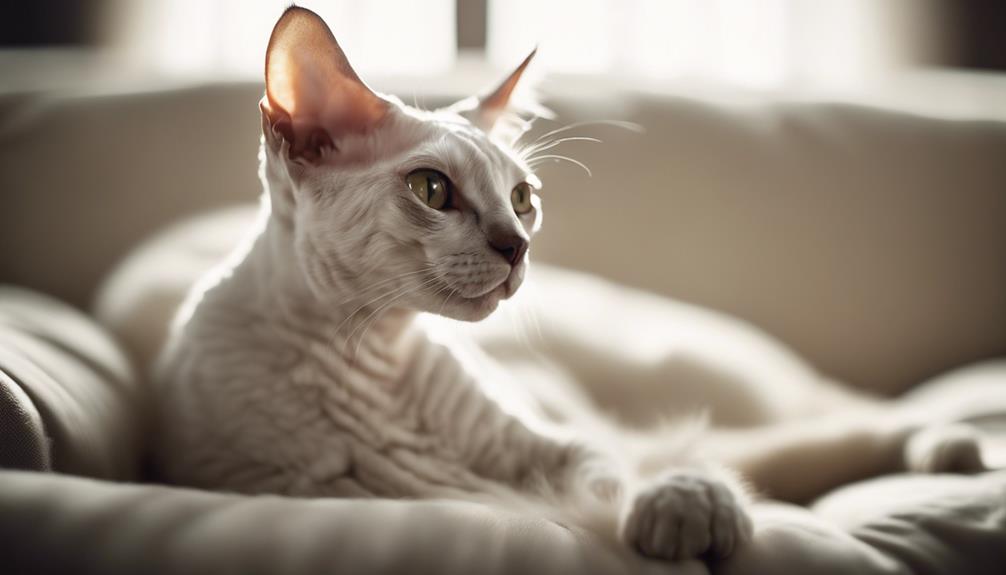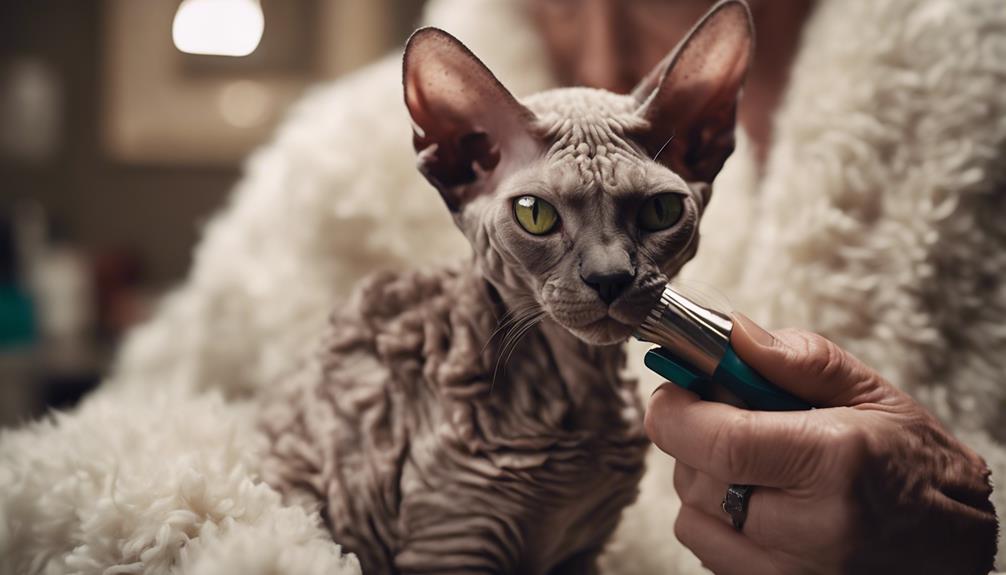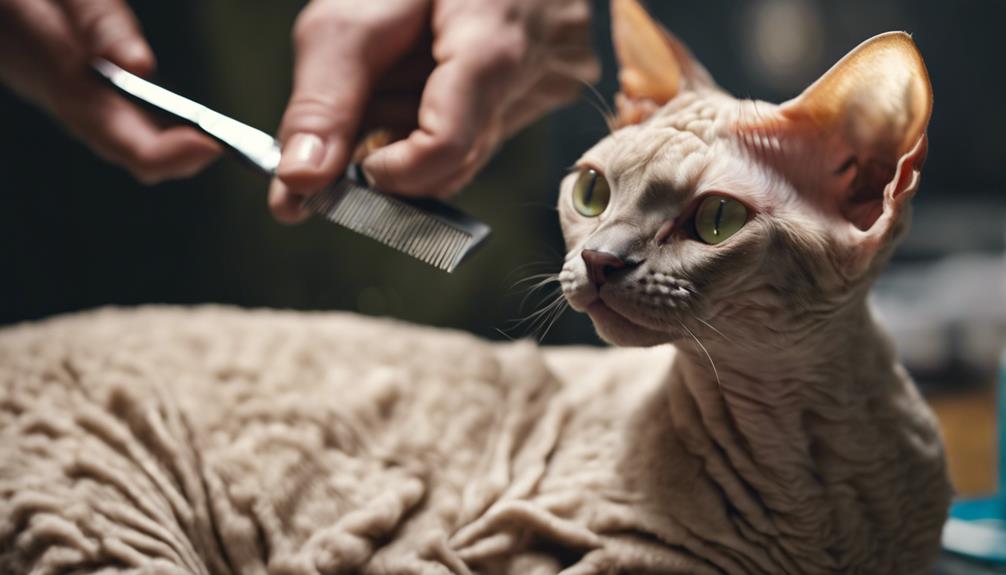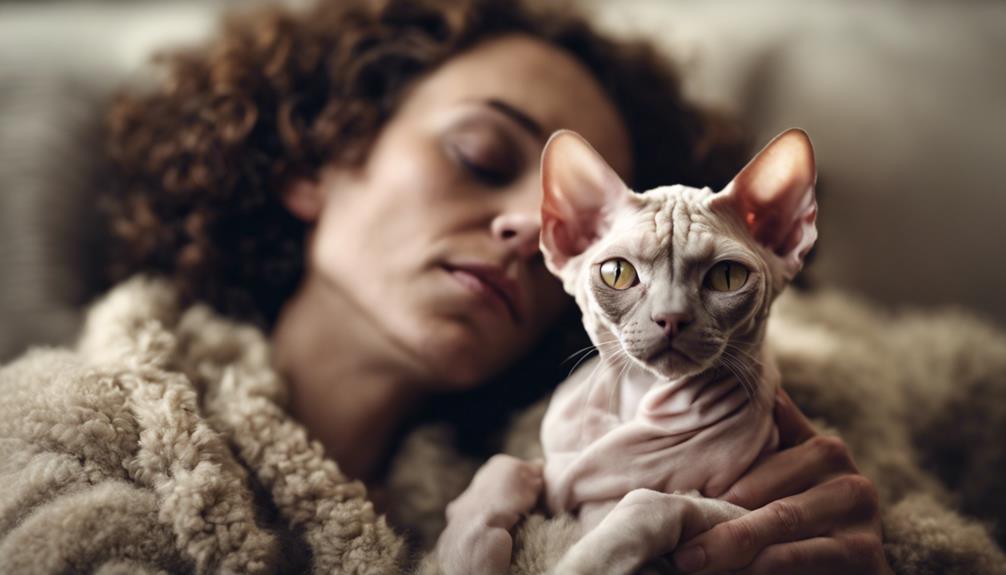As the saying goes, ‘curiosity killed the cat,’ but when it comes to Devon Rex cats and allergies, the question still remains: are they truly hypoallergenic because of their coat?
The unique curly fur of Devon Rex cats has sparked discussions about their potential to be more allergy-friendly than other breeds. However, uncovering the truth behind their hypoallergenic reputation involves exploring various factors beyond just their coat.
By delving into the complexities of cat allergens and individual sensitivities, a clearer picture emerges regarding the suitability of Devon Rex cats for allergy-prone individuals.
Key Takeaways
- The wavy coat of Devon Rex cats helps reduce allergen spread.
- Lower shedding levels in Devon Rex cats contribute to decreased allergen exposure.
- Regular grooming practices are crucial for managing allergens effectively.
- Understanding the interplay between the coat and allergies is essential for Devon Rex owners.
Understanding Devon Rex Coat and Allergies
When considering the hypoallergenic nature of Devon Rex cats, it’s crucial to comprehend the interplay between their unique coat and allergic reactions.
The wavy and soft coat of Devon Rex cats plays a pivotal role in their hypoallergenic reputation. This distinctive coat structure aids in reducing the spread of allergens, such as the Fel d 1 protein, by trapping and holding them more effectively than in breeds with different coat types.
While Devon Rex cats can still produce dander and saliva containing allergens, their shedding levels are notably lower, contributing to decreased allergen exposure.
To manage allergens effectively, regular grooming practices and the use of HEPA filters are recommended to maintain a clean environment with reduced allergen levels.
Shedding Behavior of Devon Rex Cats

Devon Rex cats exhibit minimal shedding behavior due to their unique short, wavy coat texture. This reduced shedding is a distinctive trait of the breed, making them a favorable choice for those concerned about managing shedding levels in their homes.
Here are three key factors to consider regarding the shedding behavior of Devon Rex cats:
- The wavy coat of Devon Rex cats plays a significant role in reducing shedding.
- Skin conditions can influence the shedding levels of Devon Rex cats.
- Regular grooming practices are essential to manage shedding and maintain the unique fur of Devon Rex cats.
Understanding these aspects can help owners effectively deal with shedding and keep their Devon Rex cats looking their best.
Managing Dander in Devon Rex Breeds

To effectively manage dander in Devon Rex breeds, regular grooming practices play a crucial role in reducing allergen spread and maintaining a clean living environment.
Devon Rex cats have a unique coat texture that can trap dander and minimize allergen release, benefiting allergy sufferers. Their minimal shedding behavior further reduces the amount of dander dispersed into the environment.
Grooming Tips for Devon Rex Cats

Proper grooming techniques are essential for maintaining the coat health of Devon Rex cats and minimizing allergen exposure for owners.
Grooming Tips for Devon Rex Cats:
- Regular Grooming: Consistent grooming helps manage the minimal shedding of Devon Rex cats and reduces allergen levels in their coat.
- Occasional Baths: Bathing your Devon Rex occasionally can further decrease the likelihood of triggering allergies due to their unique coat texture.
- Gentle Care: Use a damp cloth or gentle brush for grooming, as their delicate fur requires careful handling to minimize allergen exposure.
Considerations for Allergy-Prone Individuals

Considering the potential challenges faced by allergy-prone individuals, it’s crucial to understand how Devon Rex cats, despite their hypoallergenic reputation, may still pose risks for sensitive individuals.
While their unique coat texture and minimal shedding can reduce allergen exposure, spending time with a Devon Rex before committing to ownership is advisable to assess potential allergic reactions.
Individuals with mild cat allergies might experience fewer symptoms with Devon Rex cats compared to other breeds, but there’s no guarantee of complete immunity. Sensitive individuals may still develop skin allergies or breathing issues due to varying levels of allergen exposure.
It’s essential for allergy-prone individuals to carefully consider the risks associated with owning a Devon Rex cat despite their hypoallergenic qualities.




